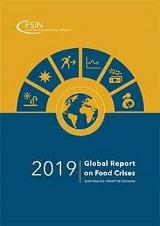Publications
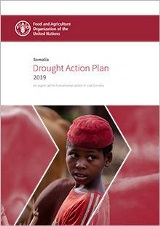
Somalia Drought Action Plan 2019
06/2019
Somalia is experiencing a severe drought across most of the country. Based on rain performance so far, the upcoming Gu harvest will likely be half of a normal year at best. This is especially grim as Somalia produces only around one-third of its cereal requirements in a normal year. Livestock are in extremely poor condition and risk dying in large numbers if the rains continue to be poor.
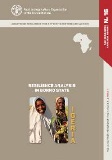
Resilience analysis in Borno State, Nigeria
06/2019
Borno State, in the northeast of Nigeria, has been reduced from a dynamic and populated rural area into a zone of displacement, hazards and food insecurity due to escalating levels of violence.
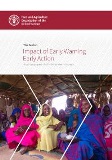
The Sudan: Impact of Early Warning Early Action
06/2019
Protecting agropastoralist livelihoods ahead of drought
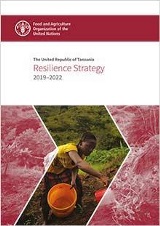
The United Republic of Tanzania Resilience Strategy 2019–2022
06/2019
Agriculture is the backbone of the economy in the United Republic of Tanzania. The sector contributes to about 30 percent of the gross domestic product, while supporting about 80 percent of rural livelihoods and producing about 95 percent of the country’s food requirements.
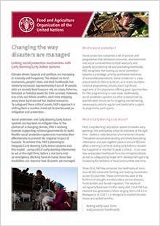
Changing the way disasters are managed
06/2019
Climate-driven hazards and conflicts are increasing in intensity and frequency. The impact on local economies, people’s lives and their livelihoods has similarly increased.
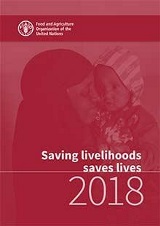
Saving livelihoods saves lives
05/2019
In recent years, the number of people experiencing acute hunger has been persistently high. And 2018 was no exception. Some 113 million people in 53 countries were acutely hungry last year.
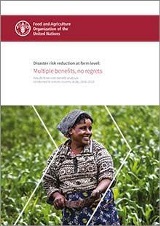
Disaster risk reduction at farm level: Multiple benefits, no regrets
05/2019
his report presents the findings of a multi-year FAO study undertaken on over 900 farms in ten different countries that measured, using field data, benefits gained through the use of innovative farming practices designed to boost the resilience of farmers in the face of natural disasters and other shocks.
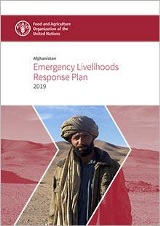
Afghanistan: Emergency Livelihoods Response Plan 2019
05/2019
Afghanistan is experiencing a major food security and livelihoods crisis, currently regarded as the world’s third largest.
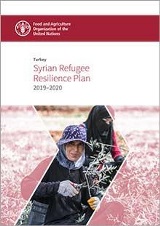
Syrian Refugee Resilience Plan 2019–2020
04/2019
The Syrian Refugee Resilience Plan (SRRP) is the guiding document for the Food and Agriculture Organization of the United Nations (FAO) to support the Government of Turkey in addressing the needs of Syrian refugees in Turkey.
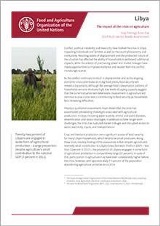
Libya: The impact of the crisis on agriculture
04/2019
Despite agriculture’s relatively small contribution to Libya’s Gross Domestic Product (GDP) – less than 3 percent in 2012 – the proportion of Libyans engaged in some form of agricultural production is comparatively large (22 percent).
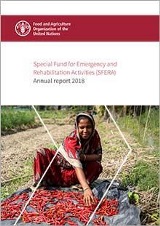
Special Fund for Emergency and Rehabilitation Activities (SFERA): Annual Report 2018
03/2019
The Special Fund for Emergency and Rehabilitation Activities (SFERA) enables the Food and Agriculture Organization of the United Nations (FAO) to take rapid and effective action in response to food and agricultural threats and emergencies.
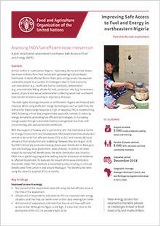
Northeastern Nigeria: Assessing FAO’s fuel-efficient stove intervention
03/2019
Armed conflict in northeastern Nigeria – Adamawa, Borno and Yobe States – has driven millions from their homes and uprooted agriculture‑based livelihoods. In worst affected Borno, poor energy access has exposed vulnerable people to a number of challenges linked to food insecurity and malnutrition, deforestation, protection risks and health risks.
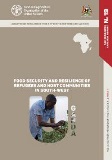
Food security and resilience of refugees and host communities in south-west Uganda
03/2019
In collaboration with the Resilience Measurement Unit under the Office of the Prime Minister in Uganda, the report compiles information on the status of food security and resilience of refugee and host community households in Kamwenge and Kyegewa districts of south-west Uganda.
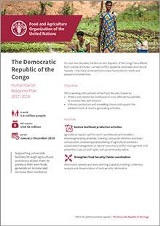
The Democratic Republic of the Congo - Humanitarian Response Plan 2017–2019
02/2019
For over two decades, the Democratic Republic of the Congo has suffered from a series of shocks – armed conflict, epidemic outbreaks and natural hazards – that have continued to increase humanitarian needs and people’s vulnerabilities. In order to provide livelihood support in 2019, FAO requires USD 50 million to support 1.8 million people.

Myanmar: Humanitarian Response Plan 2019
02/2019
The current humanitarian situation in Myanmar represents protracted displacement, human- and natural-induced crises, statelessness, limited access to food, health and livelihood opportunities, limited humanitarian access, landmines and explosive remnants.
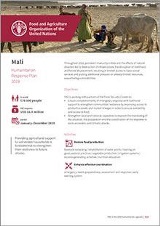
Mali: Humanitarian Response Plan 2019
02/2019
Throughout 2018, persistent insecurity in Mali and the effects of natural disasters led to destruction of infrastructure, the disruption of livelihood and forced displacement, resulting in limited access to basic social services and putting additional pressure on already limited resources, exacerbating vulnerabilities.

Libya: Humanitarian Response Plan 2019
02/2019
Conflict, political instability and insecurity have fuelled the protracted crisis in Libya, impacting individuals and families as well as the country’s economy and institutions.
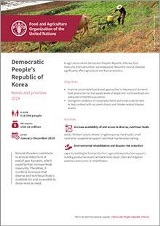
Democratic People’s Republic of Korea: Needs and priorities 2019
02/2019
The Democratic People’s Republic of Korea is critically dependent on the performance of its agriculture sector, which has been severely affected over the past six years by recurrent natural disasters, including droughts and floods. I
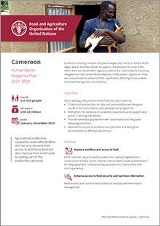
Cameroon: Humanitarian Response Plan 2017–2020
02/2019
Cameroon is facing multiple complex emergencies, mainly in the Far North region due to the Boko Haram insurgency, the secessionist crisis in the North-West and South-West regions as well as the crisis linked to incoming refugees from the Central African Republic in the eastern regions.

